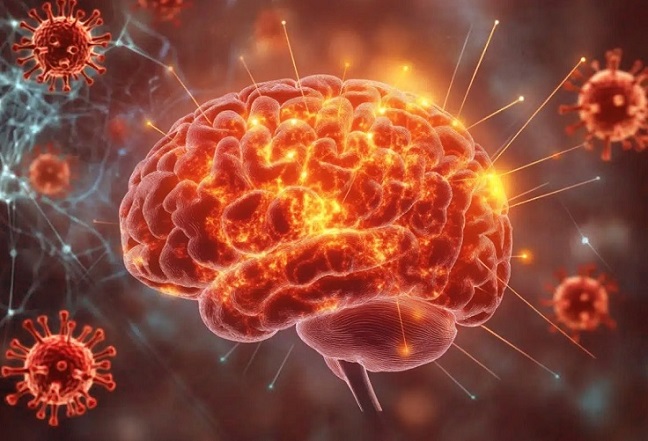COVID-19 Infection Causes Long Lasting Memory Loss by Damaging Brain Region Crucial for Separating Similar Events
Nikhil Prasad Fact checked by:Thailand Medical News Team Jun 21, 2025 8 months, 4 days, 2 hours, 41 minutes ago
Medical News:
COVID-19 Memory Damage May Stem from Brain's Hippocampus Being Affected Say German Scientists
A team of German neuroscientists has uncovered fresh evidence suggesting that memory problems following COVID-19 may be tied to specific damage in the brain’s hippocampus—an area essential for separating similar memories and learning new information.
 COVID-19 Infection Causes Long Lasting Memory Loss by Damaging Brain Region Crucial for Separating Similar Events
COVID-19 Infection Causes Long Lasting Memory Loss by Damaging Brain Region Crucial for Separating Similar Events
The research was conducted by Patric Meyer and Ann-Kathrin Zaiser from SRH University of Applied Sciences Heidelberg, Ruprecht-Karls-University Heidelberg, and the Network Aging Research in Germany. It involved a large online study of over 1400 participants, with and without a history of SARS-CoV-2 infection. Their goal was to investigate how COVID-19 affects memory and cognition in ways that go beyond general mental fog.
This
Medical News report explores how the virus’s impact on the brain may lead to a specific type of memory failure known as “pattern separation”—a vital brain function handled by the hippocampus that helps people distinguish between similar experiences, such as where they parked their car today versus yesterday.
COVID-19 and the brain’s pattern separation system
The hippocampus plays a central role in long-term memory and learning, particularly through a region known as the dentate gyrus. This part of the brain relies on something called neurogenesis—the production of new neurons throughout adult life. Scientists believe this ongoing neurogenesis is essential for helping us learn new things and separate overlapping memories.
Using a behavioral test called the Mnemonic Similarity Task (MST), the study showed that people who had been infected with COVID-19 performed significantly worse at distinguishing between similar but not identical images. This task was designed to detect subtle impairments in mnemonic pattern separation, which is closely linked to hippocampal function.
Even after adjusting for age, education, stress, depression, and anxiety, individuals with prior COVID-19 infection showed reduced ability to tell apart similar items—pointing toward a lasting disruption of hippocampal activity. In contrast, their ability to recognize familiar items (a simpler type of memory) remained unaffected.
More symptoms mean more memory problems
The study also found that the more lingering symptoms of COVID-19 a person had—such as fatigue, brain fog, headaches, or difficulty breathing—the worse their performance in the memory separation test. Surprisingly, even participants who reported feeling fully recovered still showed signs of memory dysfunction.
Importantly, the study observed that these memory issues persisted and even worsened over time. The longer it had been since infection, the more likely partic
ipants were to perform poorly in pattern separation tasks. This suggests long-term or possibly even chronic changes to brain function post-infection.
How inflammation may disrupt memory circuits
Previous research has shown that COVID-19 can trigger strong neuroinflammatory responses in the brain. This includes the release of inflammatory cytokines like CCL11, which have been linked to reduced neurogenesis and increased neuron death in the hippocampus.
Other studies have documented hippocampal shrinkage and structural damage in post-COVID patients using MRI scans. This supports the idea that COVID-19, through a combination of inflammation, reduced oxygen supply, and possibly direct viral invasion, may damage a region of the brain crucial for complex memory processing.
The researchers believe that inflammation-related damage to the dentate gyrus could be a key mechanism behind these specific memory issues. Their work also showed that poorer memory performance was linked with worse results on a separate visual memory task called the Corsi block-tapping test, further linking hippocampal function with COVID-related impairments.
Memory loss beyond brain fog
Interestingly, while the COVID group performed worse on hippocampus-linked tasks, their results on other cognitive tests such as alertness, inhibition, and task switching were largely unchanged. This suggests that the virus may selectively affect certain memory systems, rather than causing general mental decline.
The researchers emphasize that while their study used behavioral tests rather than brain scans, the pattern of results strongly suggests a biological impact on the hippocampus. Future studies using brain imaging and direct measures of neurogenesis are needed to confirm these findings.
Conclusion
This study adds to growing evidence that COVID-19 has the potential to cause long-lasting cognitive impairments, particularly in how our brain separates and stores memories. These findings may help explain why many COVID-19 survivors struggle with forgetfulness and confusion long after recovering from their infection. The damage appears to be focused on the hippocampus, a region responsible for the brain’s ability to form new, distinct memories. While some people recover fully, others—even if they feel better—may continue to experience subtle but impactful memory issues. This research underscores the importance of developing targeted therapies to help COVID-19 survivors rebuild brain health and cognitive resilience.
The study findings were published in the peer reviewed journal: Scientific Reports
https://link.springer.com/article/10.1038/s41598-025-04166-2
For the latest COVID-19 News, keep on logging to Thailand
Medical News
Read Also:
https://www.thailandmedical.news/news/german-study-finds-that-77-percent-of-individuals-with-neurological-post-covid-syndrome-have-memory-issues
https://www.thailandmedical.news/news/sars-cov-2-nsp7-protein-impairs-synaptic-plasticity-in-the-brain-leading-to-memory-loss
https://www.thailandmedical.news/news/new-research-links-covid-19-inflammation-to-memory-issues-months-after-recovery
